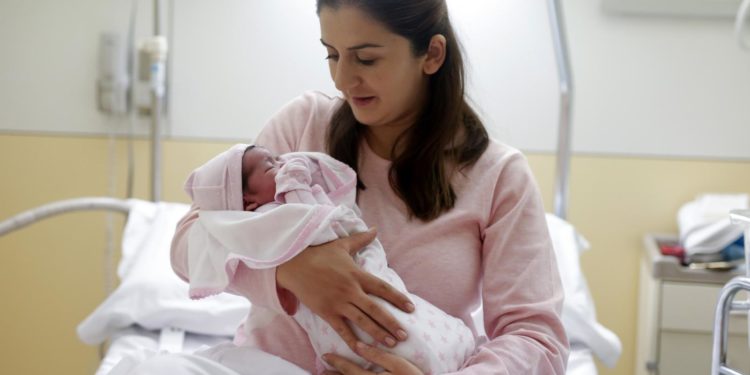Pregnancy is a special time full of excitement and anticipation. But for expectant mothers facing the outbreak of the coronavirus disease (COVID-19), fear, anxiety and uncertainty are clouding this otherwise happy time. To learn more about how women can protect themselves and their little one, we spoke with Franka Cadée, President of the International Confederation of Midwives.
Is it safe to continue prenatal check-ups?
Many expectant mothers are fearful of going to appointments while they are taking precautions, such as staying home and practicing physical distancing when outside. “You do see a lot of adaptation happening at the moment in the world where midwives are doing clinics or certain appointments by phone, so that the actual looking at the baby and the growth of the baby appointment can be short,” says Cadée. “I expect that pregnant women will find they’re seeing their healthcare professional less, to protect them and the healthcare professional from getting infected and that they will be seen live when it’s necessary.” Modifications may also be tailored for individual patients depending on their respective conditions, for example lower vs. higher-risk pregnancies.
Cadée advises mothers to find out what options are available to them from their healthcare professional and in their communities. “The person who’s taking care of you is perfectly geared to you and your own needs, so your midwife or obstetrician will know best.”
After your child is born, it is also important to continue receiving professional support and guidance, including routine immunizations. Speak to your healthcare provider about the safest way to have these appointments, for you and your baby.
If I have coronavirus disease (COVID-19) will I pass it to my baby?
We still do not know if the virus can be transmitted from a mother to her baby during pregnancy. “The COVID-19 virus has not been found in vaginal fluid, in cord blood or breastmilk,” says Cadée, although information is still emerging. To date, COVID-19 has also not been detected in amniotic fluid or the placenta.
The best thing you can do is to take all necessary precautions to prevent yourself from contracting the COVID-19 virus. However, if you’re pregnant or have just given birth and feel ill, then you should seek medical care promptly and follow instructions from your health care provider.
I was planning on giving birth in a hospital or healthcare clinic. Is this still a good option?
“Women should ask their midwife [or health care professional] what they feel is the safest place for them and how precautions are being taken from situation to situation,” recommends Cadée. “It depends on the woman, on her situation and on the healthcare system.”
“You would hope that most healthcare facilities have different facilities where those with the COVID-19 virus go in one entrance and the others in another. But in some situations that’s totally not possible,” says Cadée. “In certain high-income countries like in the Netherlands where I come from, we have a system whereby home birth is integrated within the system. So home birth within the system is safe and you are seeing more women give birth at home [but this is certainly not the case in most countries]. And even certain hotels are being used in the Netherlands by midwives for women to be able to give birth in the hotel which is made safe for a woman to give birth, so she doesn’t have to go to the hospital. But that is very much within that local context.”
For the safest option for you, it important to speak to the healthcare professional who is supporting you throughout your pregnancy and birth.
Can my partner or family member be nearby when I give birth?
While policies vary by country, Cadée believes women should have someone nearby to support them, as long as the proper precautions are taken, such as wearing a mask while in the delivery room and washing their hands. “We are finding that in certain countries people are not being allowed to be with women, and that is worrying me. I can understand that you want to reduce the number of people with a woman while she is giving birth because you’re trying to reduce contact, and that is very very logical, but let’s make sure that a woman has someone, one person, with her while she’s giving birth – her partner, her sister, her mother, [or the closest person of her choice]. And please keep the babies with the mothers.”
“We have to be compassionate and understand each situation as it is and that the healthcare professionals together with the family members are doing their best, using their common sense and listening to each other. I think that’s very important: that we try to work as a community.”
I’m feeling incredibly anxious about giving birth. What should I do to cope?
Having a plan in place for your birth can help ease feelings of anxiety by giving you more of a sense of control, but recognizing that the current situation means there may be less predictability depending where you live. “This should include who to phone when the labour begins, who will provide support during labour and where. Establish what restrictions will be in place for hospital birth regarding support people and family members,” advises Cadée.
She also recommends doing simple things at home to relax, “like [stretching] exercises, breathing exercises and giving your midwife a call if you need to.” Focus on taking care of yourself as much as you possibly can. “Eat well, drink well, put your hands on your belly and enjoy being pregnant.”
What questions should I be asking my healthcare professional?
Cadée underlines the importance of establishing a trusting relationship with your healthcare provider. “All of those questions that have to do with you and your health, I would ask them freely. If you have an open relationship with your healthcare provider – with your midwife, with your obstetrician – they will discuss these things with you and answer you openly. It is your absolute right to know these things because it’s your body and your baby.”
“Midwives are responding to increased demands on their services as are doctors and nurses, and so may take a little longer to respond,” Cadée notes. She suggests establishing a system of how and when to communicate with your healthcare professional. For example, organize routine around appointments, and how to get in touch for urgent care. It may also be helpful to talk to care providers in advance about obtaining a copy of your health records including record of prenatal care, in case of any disruption or change in services.
When it comes to your plan for giving birth, it is important to ask as many questions as you need to. Cadée suggests the following:
- Am I at risk of coronavirus disease (COVID-19) in this space? Has someone else been here with the COVID-19 virus?
- How do you separate people with the COVID-19 virus from people who have not?
- Is there enough protective clothing for the healthcare professionals?
- Am I allowed to take someone with me? If not, why not?
- Am I allowed to keep my baby with me? If not, why not?
- Am I able to breastfeed my baby? If not, why not?
- Am I allowed to give birth vaginally or do you give Caesarean section sooner? If so, why is that?
What should women pack to go into hospital given the coronavirus disease (COVID-19) outbreak?
“I don’t think women need to take anything extra, but they should take precautions well into account,” advises Cadée.
She expects some hospitals may ask women to go home more quickly than normal if they’re healthy. “Again, that will be different from area to area, from woman to woman, from hospital to hospital,” she says, recommending expecting mothers to “ask their midwife or their obstetrician for advice that’s really tailor made for them.”
Once I have given birth, what can I do to protect my newborn from the COVID-19 virus?
The best thing you can do is to keep it simple: stick to just your family and don’t ask for visitors right now. “Also make sure that your children (if you have other children) that they’re not with other children. Get your family to wash their hands and take good care of themselves,” says Cadée.
Although it’s a difficult time, Cadée recommends trying to see the positive side of having this time to bond as a family. “Sometimes it can be very busy for young mothers and fathers to have so many visitors. Enjoy the quietness of your [immediate] family together for this time. It’s quite special to be able to bond with your baby alone, discover that new human being and enjoy that.”
I am an expecting mother. What should I be doing to keep myself safe during the COVID-19 virus outbreak?
As far as the research shows, pregnant women are not at a higher risk of contracting the COVID-19 virus than any other group of people. That being said, due to changes in their bodies and immune systems, pregnant women in the last months of pregnancy can by badly affected by some respiratory infections, and so it’s important to take precautions. “I know that for pregnant women it can be really hard – of course they’re caring for themselves and for their baby and sometimes have other children as well – but as far as we know, pregnant women are not at more risk than other people are, and for that reason they need to do the same things as everyone else,” explains Cadée. She advises practicing the following physical distancing measures:
- Avoid contact with anyone displaying symptoms of coronavirus disease (COVID-19).
- Avoid public transport when possible.
- Work from home, where possible.
- Avoid large and small gatherings in public spaces, particularly in closed or confined spaces.
- Avoid physical gatherings with friends and family.
- Use telephone, texting or online services to contact your midwife, obstetrician and other essential services.
Additional protective measures include frequent hand washing with soap and water, regular cleaning and disinfection of frequently touched surfaces at home, self-monitoring of any signs or symptoms consistent with COVID-19 and seeking early care from a health care provider.
Can I safely breastfeed my baby?
“As far as we know, it is perfectly safe to continue breastfeeding. It’s the best thing a mother can do for her baby,” says Cadée. Transmission of active COVID-19 (virus that can cause infection) through breast milk and breastfeeding has not been detected to date.
If you suspect you may have the COVID-19 virus, it is important to seek medical care early and follow instructions from your health care provider. Mothers well enough to breastfeed should take precautions, including wearing a mask if available, washing hands before and after contact, and cleaning/disinfecting surfaces. If you are too ill to breastfeed, express milk and give it to your child via a clean cup and/or spoon – all while following the same precautions.
What should I do if I live in a crowded space?
Many women around the world live in close proximity to lots of other people, making physical distancing much more challenging. In such places, “I would really ask the whole community to take care of their pregnant women,” urges Cadée. She recommends that people keep their distance from pregnant women as much as possible and that certain toilets be designated for them.
And don’t forget the importance of handwashing in the community. “Handwashing is not said for nothing. COVID-19 and soap don’t like each other. It’s a simple measure that can do a lot of good,” she says. “I really hope that whatever situation people face, that the community and the healthcare professionals think of a system whereby it is as safe and secure for pregnant women, who after all are giving birth to our future. That needs to be treasured!”
Interview and article by Mandy Rich, Digital Content Writer, UNICEF.










